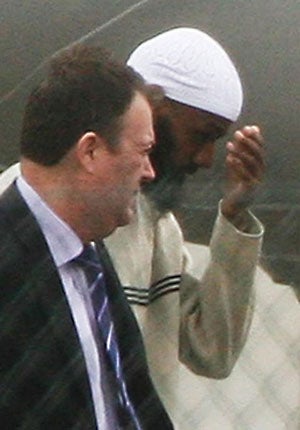‘I was victim of medieval torture,’ says freed Guantanamo detainee
Return of British resident after seven years fuels demands for Government to clarify role of MI5 agents

The seven-year ordeal of a British resident who claims he was brutally tortured before being sent to Guantanamo Bay was brought to an end last night during an emotional reunion with his family.
Binyam Mohamed’s sister, Zuhra Mohamed, said she was “overcome with joy” as she watched her brother shuffle down the steps of the RAF transport plane which had carried him from the notorious US detention camp in Cuba to Northolt airfield, west London.
She said: “When I saw him he looked like he is OK, but he will plainly not be the man I remember all those years ago.” Almost as soon as Mr Mohamed had taken his first steps on British soil, the former computer and engineering student made it clear that he had unfinished business with both the US and UK governments. In a carefully worded statement he said he intended to hold to account those he blamed for his alleged rendition, torture and unlawful imprisonment: “I am not asking for vengeance; only that the truth should be made known so that nobody in the future should have to endure what I have endured.”
Last night Mr Mohamed’s release from US custody reignited calls for the British Government to publish secret documents that would shine further light on the involvement of MI5 agents in his interrogation and alleged torture.
William Hague, the shadow Foreign Secretary, and the Liberal Democrats’ foreign affairs spokesman, Ed Davey, joined with human rights groups in calling for the Government to come clean about British complicity in Mr Mohamed’s alleged torture. Mr Mohamed, wearing a cream pullover, navy-blue trousers, white trainers and a white cap pulled over the top of his head, was accompanied by Metropolitan Police officers as he shuffled down the steps of the military aircraft steps. Unaided, he was taken to an airport interview room and detained under Port and Border Controls, part of the Terrorism Act 2000.
After further questioning by UK Border Agency officials, who will now consider renewing his British residency status which expired in 2004, he was released without charge.
Family and friends were then granted access to Mr Mohamed, who will spend some time away from the media glare. The 30-year-old Ethiopian national, who came to Britain in 1994, was held in Karachi in 2002 by American and Pakistani secret agents before being allegedly sent to Morocco, where he says he was tortured. He is the first of 250 Guantanamo detainees to be transferred under a review ordered by President Barack Obama. Ms Mohamed, 38, who had flown from America to be reunited with her brother after more than 10 years apart, described last night the family’s own ordeal in trying to find out what had happened to him.
Ms Mohamed said in an interview with The Independent that she had been repeatedly told by the US and Pakistani governments that they had no information relating to her brother – whom she had spent three years living with in Ethiopia and then two more years in America.
After he disappeared in 2002, Ms Mohamed and her other brother, Benhur, went to the FBI to ask for help to find him.
She remembers: “They first said, ‘It looks like he was in the wrong place at the wrong time.’ But then they later denied knowing anything about him at all and suggested we contact the Pakistani government. When I spoke to the Pakistani embassy, they said they didn’t know where he was either. It was only when the Red Cross contacted us in 2004 that we were aware that Binyam had been taken to Guantanamo Bay. It is now clear that all the time they [the US government] were involved in his interrogation.”
Ms Mohamed described both countries’ attitudes as “shameful”. Behur Mohamed, who came to west London in search of his brother after his disappearance, said yesterday: “It was very disheartening to know that the British had something to do with his suffering.”
Mr Hague said it was “high time the UK Government asked the new US administration for permission” to release information relating to Mr Mohamed’s case which was withheld by the High Court earlier this month.
Medical treatment: Matters of the mind
*Binyam Mohamed is expected to be referred to the Medical Foundation for the Care of Victims of Torture, in London, which has helped other Guantanamo detainees deal with the psychological effects of their experiences. Alex Sklan, a clinician who has worked with torture survivors at the foundation for more than 10 years, says it is essential that Mr Mohamed is assessed as soon as possible. “Once out of the media spotlight, Mr Mohamed will need help in addressing the serious long-term consequences of his ordeal,” says Mr Sklan. “Long after they are released, survivors of torture can suffer with nightmares related to their ordeal, intrusive thoughts about their torture, outbursts of anger and intense feelings of hopelessness.”
Join our commenting forum
Join thought-provoking conversations, follow other Independent readers and see their replies
Comments
Bookmark popover
Removed from bookmarks